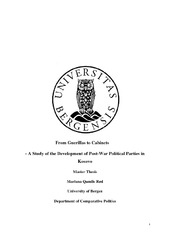| dc.description.abstract | The fourth Yugoslav war, the war in Kosovo, was fought between 1998 and 1999. The Kosovo Liberation Army and the Armed Forces of the Republic of Kosovo, fought the Serb police, military and paramilitary forces, but also at some points each other. The war was a battle between a Kosovan guerilla uprising, against a far superior Serb military power. The game changed as the international community, and most importantly NATO, intervened to put an end to the war. The KLA was a rapidly growing, sporadically organized guerilla movement. It was established as a result of increasing oppression from the Milosevic regime against the Kosovo Albanians, as a more radical faction than the pacifist Albanian resistance movement, LDK. Despite of their problems, the KLA became national heroes, and their political successors are still in 2017 dominating the political arena. This thesis main research question is; "How has the war legacy affected the development of political parties in post-conflict Kosovo?" To answer my research question, I conducted 22 qualitative interviews with Kosovan ex-combatants and politicians, in addition to an extensive document analysis. Through five different theoretical frameworks, each highlighting different important aspects affecting the development of political parties in a post-conflict state, I tried to uncover which processes and actors have been decisive in this regard. The five theories yield important results on their own, but when combined, it becomes obvious how these processes are not linear and multidimensional. The results of this thesis, show that Kosovo’s political parties are strongly affected by the war-time structures in which they operated. Well-functioning parties were expected to develop in a state with few of the necessary preconditions. They also operate in a political framework which is largely frozen along the lines of the 1999 war settlement. The result has been leadership centered, regionally concentrated parties, where those who have been successful have accepted the international community’s demands about “standards before status”. Several promising developments have taken place, but the ambivalent relationship between different actors have often led to standstills, creating severe problems of accountability and normal functioning within and between the parties. These results can help develop our understanding of party development in post-conflict cases without one clear winner due to external intervention. | en_US |
